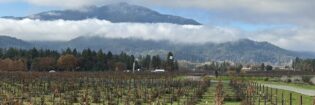Have you heard about Washington Syrah? In the last few years, this state’s version of the classic Rhône grape has been notching high marks from wine critics and consumers alike.
Among grapes grown in the Walla Walla Valley American Viticultural Area (AVA), a region that spans southeastern Washington and northeastern Oregon, Syrah is gaining ground. Of the 2,933 acres of Walla Walla vineyards, 36% are planted to Cabernet Sauvignon, followed by 18% Syrah and 16% Merlot.
Washington state farmers initially were skeptical when the first Syrah grapes were planted in 1986. Syrah is considered a warm-climate grape. Though eastern Washington is hot and dry in the summer, winters can be brutally cold. The test occurred in 1996, when winter temperatures fell to 13 to 15 below zero in the Syrah vineyards – and the grape survived just fine. After that, growers and winemakers began to embrace Syrah as the state’s potentially next big wine.
With Walla Walla Wine Month and Earth Month converging in April, the time is right to open a L’Ecole No. 41 Syrah from their estate Seven Hills Vineyard. L’Ecole, one of the region’s largest producers, is partnering this year with wine bloggers to share the diversity of wines they produce. Check out my previous posts on their Cabernet Franc/Merlot blend, Cabernet Sauvignon and Semillon, and Columbia Valley Merlot. (Please note that while the wines for these posts are provided, opinions are my own.)
Seven Hills Vineyard is a warm parcel of land consisting of loess soil, a super-fine, pulverized granite that derives from ancient glacial activity and has the feel of talc. L’Ecole and two other partners farm this 170-acre site. Converted to sustainable farming practices, the vineyard is now certified third-party LIVE and Salmon-Safe through VINEA, a voluntary coalition of winegrowers pursuing sustainability in the Walla Walla Valley. VINEA is now developing a new third-party sustainable certification tailored to the region.
Sustainability at L’Ecole
Wine grape growing in eastern Washington is naturally sustainable because many pests, such as insects, fungal diseases and weeds, can’t handle the hot, dry summers and winter freezes. Lightweight, super-fine soils aren’t suited to many pests either. Washington grapes were famously unaffected by Phylloxera, the pest that ravaged vineyards in Europe and elsewhere. Controlled (deficit) irrigation and canopy management used by farmers throughout Washington reduce the environment for some pests, too.
“We focus on soil biology and vine health, choosing minimal input and targeted-impact farming practices. Everything we do is aimed at nurturing the long-term health of our vineyards, ensuring they thrive well into the future. We use IPM (Integrated Pest Management) processes for better farming decisions and we don’t use herbicides.” – L’Ecole website
L’Ecole’s low-input sustainable practices include:
- A minimum of 5% of land dedicated to biodiversity, including trees, shrubs, wildflowers, lavender, snowy buckwheat, wild hyacinth, big sagebrush, yarrow, and native grasses. Native plants attract pollinators and beneficial insects. Dry native grasses serve as cover crops in the vineyard rows to protect against soil erosion, control dust, and increase water-holding capacity.
- Raptor perches to attract hawks into the area that combat pest bird species. A falconer is brought in a couple of times each fall to control birds during the harvest months.
- Compost and compost teas to add organic matter and build the life of the soil. These applications are good for the beneficial mycorrhizal fungi that support vineyard roots.
- A pepper-based tape on some edge rows and vines as a deterrent to deer that feed on young shoots.
- Pheromone monitoring to track grape mealybug, a pest that can spread leafroll virus. The pheromone does not disrupt or interrupt pest life cycles, but rather acts as a tool to monitor peak populations. This helps with the timing of pesticide applications and only applied in a way that will not harm beneficial insects.
Sadie Drury, L’Ecole’s viticulturalist, has adopted a safety-focused philosophy for herself and her vineyard workers – to be able to go home every day and be with her kids. That means tending the vineyards without the need to wear highly protective gear like hazmat suits.
The results from these sustainable practices are healthier vines, reduced erosion, and a lower carbon footprint.
The wine – 2018 L’Ecole No. 41 Syrah, Walla Walla Valley
100% Seven Hills Vineyard Syrah
Winemaker Marcus Rafanelli calls the 2018 Syrah “a unicorn vintage” for its “low disease pressure, perfect ripening, and great hang time.”
Grapes were sourced from three separate blocks in Seven Hills. Each block was hand harvested. About 20% of the fruit was fermented whole cluster on stems for added tannin and structure, while the remainder was gently crushed into stainless-steel fermenters. Punched down by hand, the fruit was not pumped until it went into French oak barrels, 40% of them new, with four rackings over18 months.
My tasting notes: Inky purple in color. Blackberry, spice, smoky grill, and garrigue herbs contribute to a fruity, savory nose. The palate blends blackberry, plum, spice, and black pepper notes with polished, integrated tannins. Medium+ acidity. Long finish. At 15% alcohol, this wine is lush but not jammy. Price: $36.
Suggested pairings: Savory dishes such as lamb or beef stew, cheesy lasagna, and grilled meat or portabella mushrooms.
Sources: History Link, L’Ecole No. 41, Walla Walla Valley Wine, Washington State Wine.




